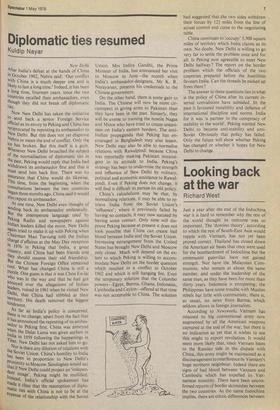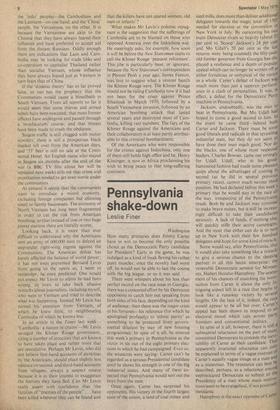Looking back at the war
Richard West
Just a year after the end of the Indochina war it is hard to remember why the rest or the world thought its outcome was so important. The 'domino theory', according to which the rest of South-East Asia would topple with Vietnam, has not yet been proved correct. Thailand has closed down the American air bases that once were used for the bombardment of Indochina but the communist guerrillas have not gained strength. Nor have the Malaysian Communists, who remain at about the same number, and under the leadership of the same man, as they have been for more than thirty years. Indonesia is prospering; the Philippines have some trouble with Muslim rebels but little with communists; there is, as usual, no news from Burma, which seldom allows in foreign journalists.
According to Newsweek, Vietnam has retained its big conventional army now augmented by all the American weapons captured at the end of the war, but there is no indication as yet that it wishes to use this might to export revolution. It would seem more likely that, since Vietnam leans to the Russian side in the dispute with China, this army might be maintained as a discouragement to interference by Vietnam's huge northern neighbour. Indeed there are signs of bad blood between Vietnam and Cambodia which has expelled its Vietnamese minority. There have been unconfirmed reports of border skirmishes between the two countries. As the name Indochina implies, there are ethnic differences between the 'indo' peoples—the Cambodians and the Laotians—on one hand, and the 'China' people, the Vietnamese, on the other. It is because the Vietnamese are akin to the Chinese that they have always feared their influence and have preferred to accept aid from the distant Russians. Oddly enough there are indications that Laos and Cambodia may be looking for trade links and co-operation to capitalist Thailand rather than socialist Vietnam, whose influence they have always feared just as Vietnam in turn fears that of China.
If the 'domino theory' has so far proved false, so too has the prophecy that the Communists would cause a bloodbath in South Vietnam. From all reports so far it would seem that some thieves and armed rebels have been executed; that most former officers have undergone and passed through a 're-educatidn' course; and that threats have been made to crush the obdurate.
Saigon traffic is still clogged with motor scooters; there is still a prosperous black market left over from the American days, and '33' beer is still on sale at the Continental Hotel. An English nurse who stayed in Saigon six months after the end of the war (a BBC TV film about her will be repeated next week) tells me that crime and prostitution tended to get even worse under the communists.
At present it seems that the communists want to introduce a mixed economy, excluding foreign companies but allowing small or family businesses. The economy of North Vietnam has long been fragmented in order to cut the risk from American bombing, so that instead of one or two huge power stations there are literally scores.
Looking back, it is more than ever difficult to understand why the Americans.
sent an army of 600,000 men to defend an unpopular right-wing regime against the Communists. The American defeat has barely affected the balance of world power; it has not even prevented Bernard Levin from going to the opera as, I seem to remember, he once predicted. One would not expect Mr Levin to admit he had been wrong, or even to take back abusive remarks about journalists, including myself, who went to Vietnam and tried to describe what was happening. Instead Mr Levin has turned his attention from Vietnam, of which he knew little, to neighbouring Cambodia of which he knows less.
In an article in the Times last week — Ai 'Cambodia: a.nation in chains'—Mr Levin savaged the Khmer Rouge government, citing a number of atrocities that are known to have taken place and rather more that are speculative. Perhaps Mr Levin, who did not believe first-hand accounts of atrocities by the Americans, should place slightly less reliance on secondand third-hand accounts from refugees, always a suspect source because it is in their interest to exaggerate the horrors they have fled. Can Mr Levin really assert with confidence that 'the families of -enemies of the people" ....have been killed wherever they can be found and
that the killers have not spared women, old men or infants' ?
What makes Mr Levin's polemic repugnant is the suggestion that the sufferings of Cambodia are to be blamed on those who opposed America over the Indochina war. He sneeringly asks, for example, how soon it will be before the New Statesman starts to call the Khmer Rouge 'peasant reformers'. This jibe is particularly base, or ignorant, because the New Statesman's correspondent in Phnom Penh a year ago, James Fenton, was first to suggest what a sinister bunCh the Khmer Rouge were. The Khmer Rouge Would not be ruling Cambodia now if it had not been for the coup against Prince Sihanouk in March 1970, followed by a South Vietnamese invasion, followed by an American bombing attack that lasted several years and destroyed most of Cambodia, killing vast numbers. The fury of the Khmer Rouge against the Americans and their collaborators is at least partly attributable to this criminal bombardment.
Of the Americans who were responsible for the crimes against Indochina, only one of them still holds high office and he, Henry Kissinger, is now in Africa proclaiming his wish to bring peace to that long-suffering continent.



































 Previous page
Previous page